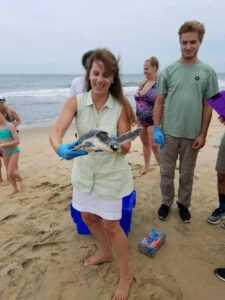For Women’s History Month, we caught up with MARCO Management Board member Laura McKay to learn more about her distinguished career in ocean planning and science. Today she serves as the program manager for the Virginia Department of Environmental Quality’s Coastal Zone Management Program.
Where did you grow up and how did you become interested in science?

McKay prepares to release a rehabilitated Kemp’s ridley sea turtle in Virginia.
I was born in Massachusetts, growing up in Reading and Topsfield, north of Boston. My parents loved the beach and we spent many summer days at Crane’s Beach playing in the sand and ocean, ever watching for the “undertoad” as we called it.
When I was a teenager my family moved to Kinderhook, New York, south of Albany. We all missed the ocean and so had the good fortune of renting a cottage on Goose Rocks Beach each year for the month of June. Walking on the beach, being fascinated by the tide pools and spending hours watching the seagulls, seals and other wildlife instilled a huge love in me for the coast and gave me a sense of peace and freedom.
In high school I loved biology and languages but never thought of myself as a scientist. In college, back in Massachusetts, I gravitated to those courses along with art history. Until a dear friend pushed me to think about what I would do in the world. I loved environmental biology but avoided chemistry and math and couldn’t foresee a future as a scientist working in a lab or studying just one narrow aspect of science. I also wanted to do something to be in a position of saving what I love. So I created an interdisciplinary environmental studies major combing classes in government, biology and geology. That eventually led me to a NY Sea Grant Scholarship and a Master’s in Public Administration/Policy Analysis.
What do you love most about your career?
What I love most is being in a position to learn from scientists, policy experts, administrators, stakeholders, business people and colleagues what all the intricacies of a coastal management problem are and then having the huge privilege of using our CZM funds from NOAA to try to fix those problems. What could be more challenging and, on occasion, more rewarding, than feeling like you have helped protect something you love?
What is an example of a challenge you’ve experienced being a woman in science? How did you overcome it?
Although I don’t consider myself a scientist, I can say I have been incredibly lucky never to have been made to feel lesser due to my gender. Perhaps going to a girls’ high school and a women’s college protected me from gender bias in my most formative years. I also had the good fortune, back in 1982 at NY Sea Grant, to have a typical “gray beard male scientist” boss who was atypical in his attitudes. I will never forget, when I was not only the only female in a room of male scientists, but also the youngest, how respectfully he introduced me to these men as “his colleague.” Gestures like that can go a very long way to instilling confidence.
What advice do you have for other women scientists and ocean planners?
My advice is once you find the place where you think you can make a difference, stick with it. Perseverance is so important. Environmental change takes a very long time. Political winds change too and it’s often tempting to give up and move on to other things. But if you do, you may never get to see the fruits of your work.
